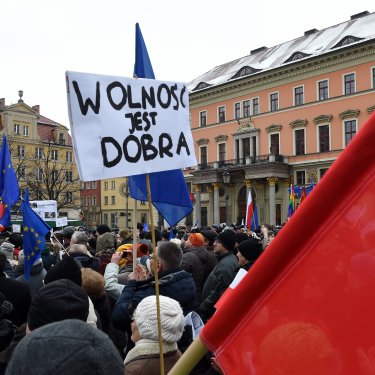RSF calls for EU financial sanctions against Poland

Reporters Without Borders (RSF) urges the European Union to adopt sanctions, above all financial sanctions, against Poland in response to its grave and repeated violations of media freedom and pluralism.
As the deadline that the EU gave Poland for amending its controversial judicial system reforms expires today, RSF calls for the triggering of the sanctions procedure envisaged in Article 7 of the Treaty on European Union.
The Polish government has been flouting media freedom, especially media independence, for the past year. Under Article 7, in the event of a “serious breach by a member state” of the EU’s fundamental values, the European Council “may decide to suspend certain of the rights” of the member state “including the voting rights of the representative of the government of that member state in the Council.”
RSF asks the EU to invoke the Article 7 procedure and to suspend Poland’s right to receive certain forms of assistance and structural policy benefits, especially as Poland is the member country that gets the most EU funding.
“The European Union cannot allow one of its most important members to trample on the values of media freedom, pluralism and independence, which constitute the EU’s identity, its strength and perhaps even its raison d’être,” RSF secretary-general Christophe Deloire said.
“The EU must use the legal tools at its disposal to sanction Poland and put a stop to the media freedom violations. As this country is one of the main beneficiaries of EU funding, the EU must not hesitate to hit where Poland where it hurts financially by cutting off certain forms of assistance.”
Media independence has been badly hit in Poland since the current parliament’s election in October 2015. The public media have been brought under political control, economic pressure has been put on journalists and privately-owned media have been throttled.
These are grave violations of the fundamental EU values of freedom, democracy, the rule of law and pluralism – values that are supposed to be “common to the member states” under Article 2 of the Treaty on European Union. Media freedom and pluralism are not only part of these values but also an essential condition for the existence of the others.
As a result of a media law passed in November 2015, the directors and supervisory councils of the public TV and radio stations were immediately fired, while the treasury minister was able to appoint new directors without reference to the independent National Broadcasting Council. The public media thereby became state-owned national media which the government has turned into propaganda tools.
As the November 2015 media law ceased to have effect in June, a new law was drafted but has been postponed for the time being because of national and international pressure. Entitled “Great Law on the Media,” it plans to enshrine the “preservation of patriotic (...) Christian (...) and family values.” It also envisages forcing the media “to disseminate all the announcements of parliament, the senate speaker and the president.”
The Council of Europe has published negative comments about the proposed law, which would violate the news media’s editorial independence and freedom.
In reaction to the criticism, a National Media Council (CNM) was hastily created at the end of June pending the controversial new law’s adoption. Its powers included appointing and firing the heads of the national media – TVP, the national radio and the PAP news agency. The bridging law creating the CNM uses much of the proposed new law’s wording and gives the CNM disproportionate prerogatives, allowing it to influence the editorial decisions of these media and put pressure on their directors.
There have been other forms of pressure on the public media. Around 150 journalists had been fired, forced to resign or forced to accept less senior positions by the spring of 2016. And around 100 other journalists working in local positions in the public media have been affected by a more recent wave of firings and voluntary departures.
Pressure is also being put on the privately-owned media, now the only source of media resistance to Jaroslaw Kaczynski’s populist propaganda. The pro-European daily Gazeta Wyborzca, in particular, is being targeted because it embodies the liberal democratic values that Kaczynski’s ruling Law and Justice party (PiS) cannot stand.
The retaliatory measures have including banning government agencies and the courts from renewing their Gazeta Wyborzca subscriptions in a bid to strangle the newspaper economically. Two other independent print media outlets, Polityka and Newsweek-Polska, have been the targets of similar bans. State advertising in these newspapers has also been slashed, reducing their income even more.
The ultra-nationalist right has meanwhile embarked on a rewriting of Poland’s history designed to paper over some of the worst moments. A new law sanctions “harming Poland’s image,” while public use of the term “Polish concentration camps” instead of “Nazi concentration camps” is now punishable by up to three years in prison.



